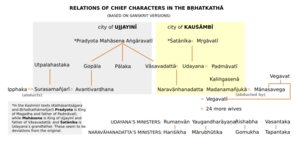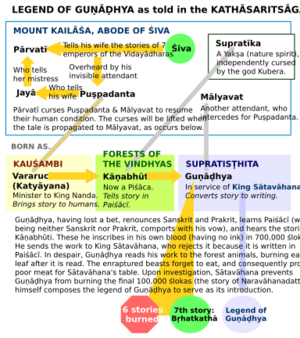Brihatkatha facts for kids
| by Guṇāḍhya | |

Probable relationship between versions of the Brihatkatha
|
|
| Language | Paisaci |
|---|---|
| Form | epic |
The Bṛhatkathā (which means "the Great Narrative" or "Big Story" in Sanskrit) was an ancient Indian epic. It was supposedly written by a poet named Guṇāḍhya. He wrote it in a language called Paiśācī, which we don't know much about today.
Sadly, the original Bṛhatkathā book is now lost. But we know about it because many other stories were inspired by it. These later books, like the Kathāsaritsāgara and Bṛhatkathāmañjarī, tell us what the original story might have been like.
We're not exactly sure when the Bṛhatkathā was written. Other famous Indian poets from the 6th century CE mentioned it, so it must have existed by then. Some experts think it's even older, possibly from before the 3rd century CE.
Contents
What We Think Was in the Story
Even though the original Bṛhatkathā is lost, we can guess a lot about its content. This is because many later stories were based on it. These stories are all a bit different, but they share many similar parts.
The Story of Prince Udayana
The Bṛhatkathā likely started with the adventures of Prince Udayana. His mother, Mṛgāvatī, was pregnant and had a special craving. She needed to be covered in red. A huge bird mistakenly thought she was raw meat and carried her away.
The bird later dropped her, but she was safe. She was cared for in a quiet hermitage, where she raised her son, Udayana. As he grew up, Udayana became very skilled. He learned to play a wonderful lute and became excellent at taming elephants.
Eventually, Udayana and his mother returned to their home city, Kauśāmbī. Later, Udayana was captured by King Pradyota of Ujjayinī. While there, he taught the lute to Pradyota's daughter, Vāsavadattā. They fell deeply in love.
Udayana and Vāsavadattā managed to escape together. They returned to Kauśāmbī, where Udayana became the rightful king. They got married and lived happily. However, Udayana's ministers worried he was becoming too soft. They also wanted a new political alliance.
So, the ministers tricked Udayana into believing Vāsavadattā had died. They then arranged for him to marry another princess, Padmāvatī. Luckily, Udayana was later reunited with Vāsavadattā. Even after all this, Udayana and Vāsavadattā didn't have children for a long time.
Finally, with a special gift from the god Kubera, Vāsavadattā became pregnant. She gave birth to a son named Naravāhanadatta. His name means "given by Kubera." It was believed that Naravāhanadatta was destined to become a powerful emperor.
The Adventures of Naravāhanadatta
Udayana's life story was just the beginning. The main part of the Bṛhatkathā was about his son, Naravāhanadatta. Unlike his father, who appears in many other stories, Naravāhanadatta is mostly known from texts directly linked to the Bṛhatkathā. His journey to become emperor was full of exciting adventures.
| Sanskrit | Mahārāṣṭri |
|---|---|
| Naravānhanadatta | Vasudeva |
| Udayana | Aṃdhagavaṇhi |
The Legend of How It Began
The Kathasaritsagara, one of the books inspired by Bṛhatkathā, tells a fascinating story about how the Bṛhatkathā came to be. It says that the author, Gunadhya, was once a very wise scholar. He made a promise to the god Shiva.
Because of this promise, Gunadhya ended up writing his great story in the Paiśācī language. This language was not widely understood. The legend explains that Gunadhya wrote the Bṛhatkathā on leaves, using his own blood as ink. This shows how dedicated he was to his amazing tale.
Images for kids




